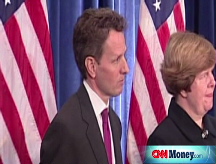Treasury sends another $4B to banks
Another round of capital investments under the $700 billion bailout brings the total amount dispersed to publicly traded banks to $165.3 billion.
NEW YORK (CNNMoney.com) -- Treasury sent out $3.9 billion in checks to another 35 banks last week as part of the government's $700 billion financial rescue plan.
Under the Troubled Asset Relief Program, Treasury has allocated $250 billion of the bailout funds for capital investments in banks. After an application process, Treasury lends funds to banks in exchange for preferred shares and a high-paying dividend. The aim: to encourage strapped-for-cash banks to lend money to other financial institutions, promoting much-needed liquidity in the financial markets.
As of last Friday, the government has injected $165.3 billion into 87 banks. In the latest round, San Juan, Puerto Rico-based Popular, Inc. (BPOP) got the largest amount, receiving $935 million. South Financial Group (TSFG), East West Bankcorp (EWBC) and Sterling Financial Corp. (STSA) each received more than $300 million.
(Click for a list of all 87 banks that have gotten bailout funds.)
The capital investment plan has received the largest portion of the bailout money so far but was not part of the Treasury's initial strategy, which included buying up droves of toxic mortgage-backed securities. But the Treasury soon abandoned its initial bid, saying capital injections served as the best method of restoring the financial markets to normalcy.
The plan has been the target of much criticism from lawmakers. Some object to the largest and most solvent banks receiving the largest sums of money. For instance, Wells Fargo (WFC, Fortune 500), JPMorgan Chase (JPM, Fortune 500) and Citigroup (C, Fortune 500) all received $25 billion and Citigroup is set to receive another $20 billion from Treasury.
The House Financial Services Committee will hear testimony on Wednesday from a key TARP official as well as several government-installed oversight personnel on Treasury's handling of the bailout. Lawmakers on both sides of the aisle have criticized Treasury for lack of clear direction, oversight and accountability. ![]()


